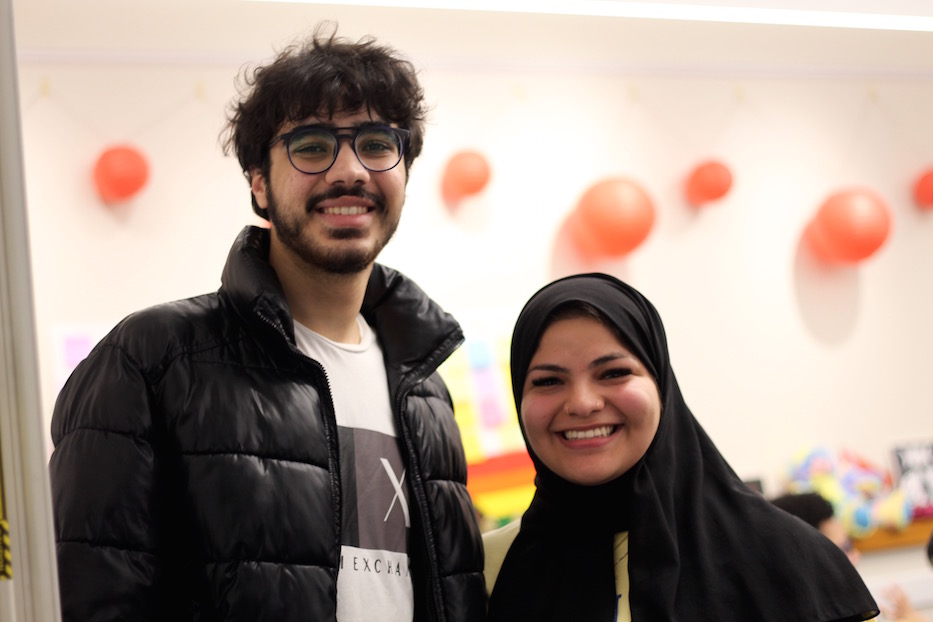
Culture & Community | Faith & Spirituality | Arts & Culture | West Haven | University of New Haven | Ramadan
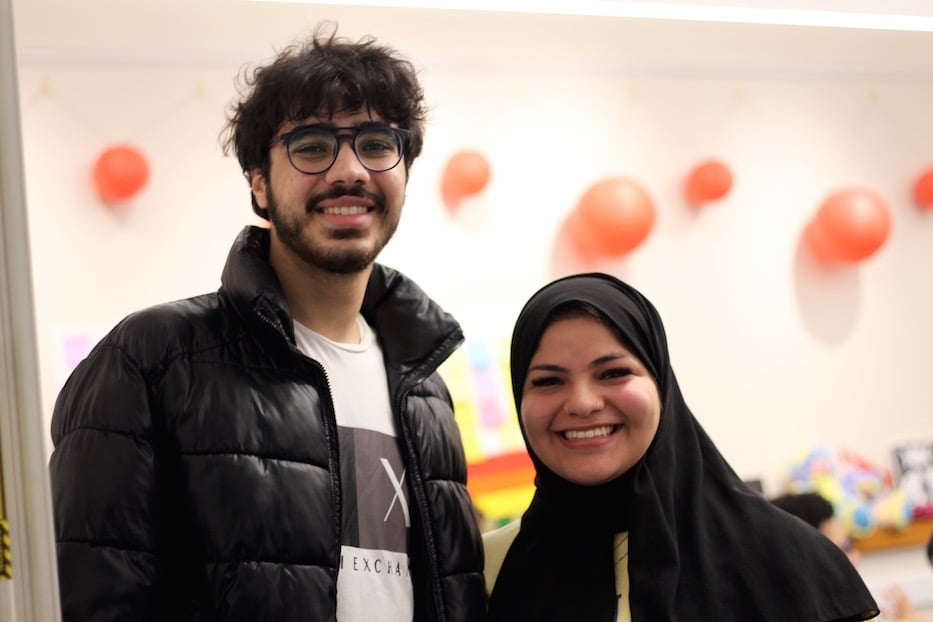
Youssef Ossama and Adrielys Gómez. Lucy Gellman Photos.
Youssef Ossama made a promise to himself at the beginning of Ramadan. This was the year he would pray five times a day, even if it meant working around his class schedule. It was the year that he would reflect on what it meant to be a better Muslim, a better student, a better human. It was the year that he would dive into Ramadan traditions fully—not for his family, but for himself.
Thanks to a new, peer-led effort to support Muslim students on campus, he’s been able to keep that vow.
Ossama is a sophomore at the University of New Haven (UNH), where a nascent Muslim Student Association (MSA) is helping students observe Ramadan with communal Iftars, weekly meetings, and a modified meal plan for those who are fasting. Last Thursday, he joined two dozen members of the group as they filed into the Myatt Center for Diversity and Inclusion, waiting out the last hour of sunlight with remarks from Imam Omer Bajwa.
Bajwa, director of Muslim life in the Chaplain’s Office at Yale, sought to feed their spirits before they broke fast in community. (See more below.)
“Ramadan this year, it feels very different,” said Ossama, who is treasurer of the MSA and an active member. “I have been reflecting a lot on religiosity … how to internalize it. It’s hard to take that in and take action on it. You have to have that intention in your heart.”
Creating Campus Community
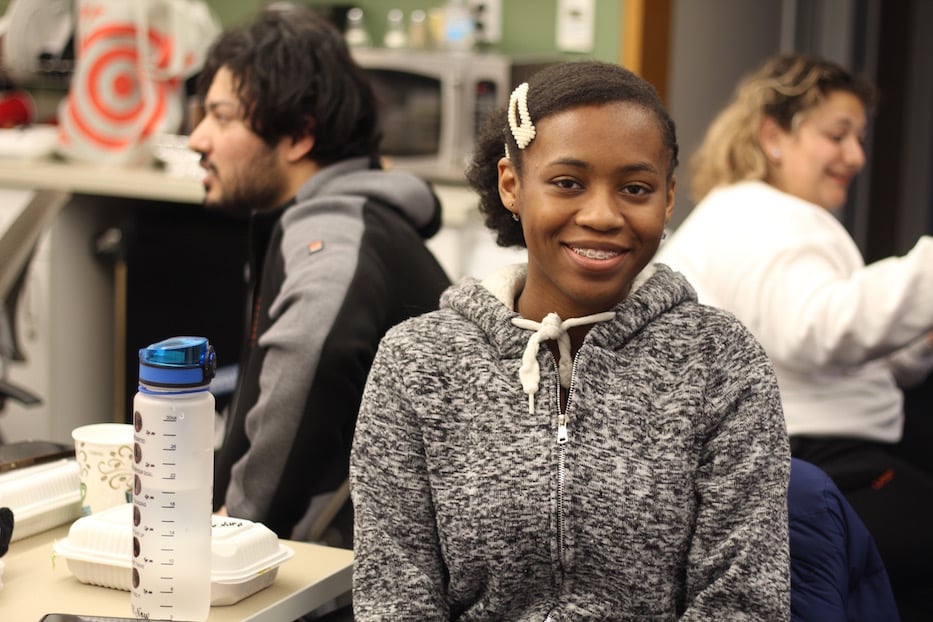
Freshman Secora Chambers, who is studying marketing. While she isn't Muslim, she comes to almost every meeting on the MSA as a supporter and friend. "I love hearing what he had to say," she said of Bajwa. "I love learning."
The MSA came into being last May, when many of UNH’s students were still taking classes remotely. From her home in New Haven, then-junior Adrielys Gómez thought about how deeply she wanted a place where Muslim students could get to know each other. At that stage of the pandemic, it felt doubly hard—students were already isolated as Muslims on campus, and also isolated because they were on Zoom. Some were logging into class from as far away as Egypt and Jordan.
“In a community where there are not a lot of us to band together,” a central hub felt vital, Gómez said. Born and raised in Puerto Rico, she didn’t have a built-in community to observe Ramadan with. She converted to the faith at 16, after moving to New Haven for high school at Engineering and Science University Magnet School (ESUMS). At UNH, she is an economics major, and had trouble plugging into Muslim life because there was no single place to do it.
During her junior year, she began to circulate a notice to other students and teachers, including an Arabic professor through whom she met Ossama and MSA Vice President Shahd Omar. After months of meeting on Zoom last year, the MSA transitioned back to weekly in-person meetings on campus. They break fast together once a week in the Myatt Center’s main room.
Ossama, who has been fasting since he was six or seven, worked with campus dining services and the school’s Hillel to arrange meals for students. Students can also pick up extra food for their pre-dawn Suhur meal in the evening, because it falls so early in the day this time of year.
“It’s the first time that we are able to really have Iftar together,” Gómez said Thursday. She stood close to a bubbly, multilingual group of students, where threads of Arabic and English wove gracefully around each other. At three long tables, students quietly set down their notebooks, homework and laptop computers to catch up with each other. A few created groups of three or four chairs in the back of the room.
When Bajwa arrived, the room fell silent. As he began to write on a dry erase board in the front of the room, all eyes remained on him. No sooner had the word Taqwa appeared in thick red marker than he was speaking in whole paragraphs, his hands fluttering in motion.
“Work On Your Empathy”
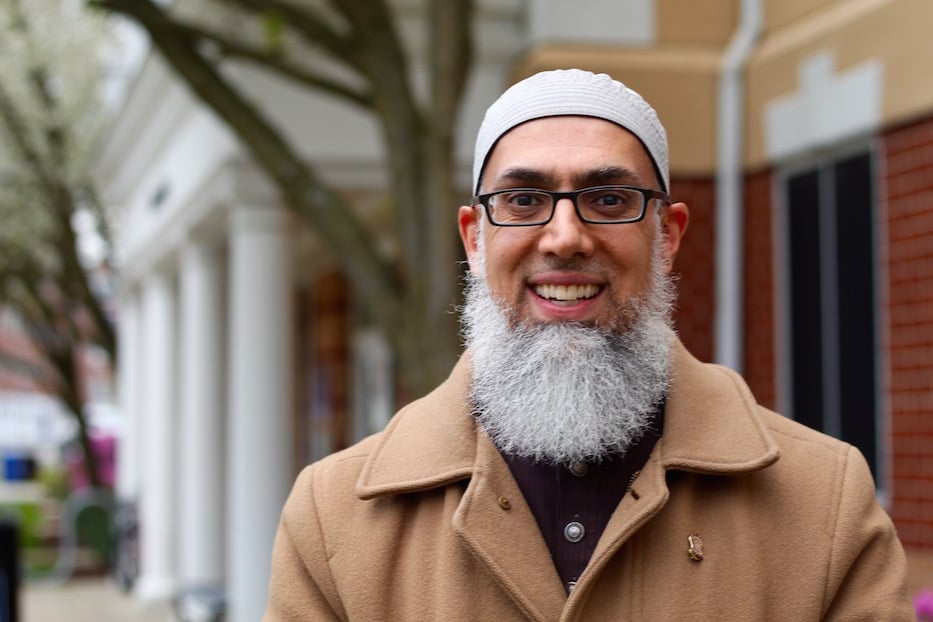
Omer Bajwa. He left shortly before dusk to break fast with his own family.
For Bajwa, Ramadan is a time of intense contemplation that he refers to as “God-consciousness” or Taqwa, in which the human and the divine are closer to each other than they are for the rest of the year. Within that consciousness, there are both outward prohibitions and injunctions—the renunciation of food, drink, and sex, for instance, and the order to fast and pray—and inward prohibitions and inward injunctions.
The latter include internal or self work, including a prohibition on jealousy, anger, gossip and spitefulness, and an order to practice mercy, forgiveness, mindfulness, and submission.
“Allah is saying, ‘I’m going to give you the most hospitable moment,’” he said, describing Ramadan as a gift. Each day, Bajwa rises around 3:30 a.m. to eat a small meal and drink water, in what Muslims refer to as the Suhoor meal that they take before sunrise. While at work and later at home, he makes time to pray five times a day. He ends a 15-hour fast close to 8 p.m., after dusk has given way to the dark.
Speaking as the sun began a slow descent outside, he urged students not to think of the month as one of deprivation, but as a chance to focus inward. He was, himself, hungry and dehydrated, he said to a few knowing laughs—he had spent the previous night’s Iftar eating biryani with a close friend, and only realized how salty it was after his fast had started. He had not had any water since prayers very early that morning.
And yet, he was also feeling nourished. He explained that Suhoor falls within the last third of the night, “when Allah comes down from the lowest level of heaven down to earth.” That time is a pocket of sacred space, during which Muslims can appeal to a higher power in prayer.
“How many people do not get up for Suhoor and Fajr?” he asked, referring to the first prayer of the day. He watched quietly as just a few hands went up across the room. Thanking students for their honesty, he stressed the importance of waking up each morning, even if it is only to take a sip of water, say a prayer and go back to bed before a day of fasting.
Ramadan, he continued, is “the ultimate pattern disruption.” He scribbled the words Pattern Disruption on the board as students watched. In psychology, pattern disruption is exactly what it sounds like. A person acknowledges that there’s a behavioral pattern—usually a harmful one—and disrupts it as a way to create new behavior.
The same principle applies in Islam, Bajwa said—and Ramadan is an opportunity to do it.
“Ramadan is teaching you—it is really the perfect class to teach you you can change,” he said. “Imagine you took that to heart. How much better would life be?”
Every so often, the door opened to a burst of sound, as another student slipped in. Just outside the window, the voices of Lauryn Hill and Nicki Minaj blared over a speaker system as students bounced on a multicolored inflatable castle. Inside, Bajwa paid it no mind. He looked to fasting as a time for reflection.
“You need, I need, we all need to come out of Ramadan a better person, a more forgiving person, a more patient person,” he said.
At the front of the room, junior Laila Soliman raised their hand. They were still struggling to internalize Ramadan, they explained. The white of their sweatshirt glowed under the student center’s lights and against the setting sun. From the back of the room, a second student chimed in: they too were having trouble feeling that internal peace and reflection during the holy month.
“Ramadan is not a magic pill,” Bajwa said. “It’s a lifelong process of conditioning … Islam is a marathon, it’s not a sprint. Some days, it’s two steps forward, one step back. Some days, it’s two steps back, one step forward. The thing is to keep moving forward.”
A Sense Of Belonging
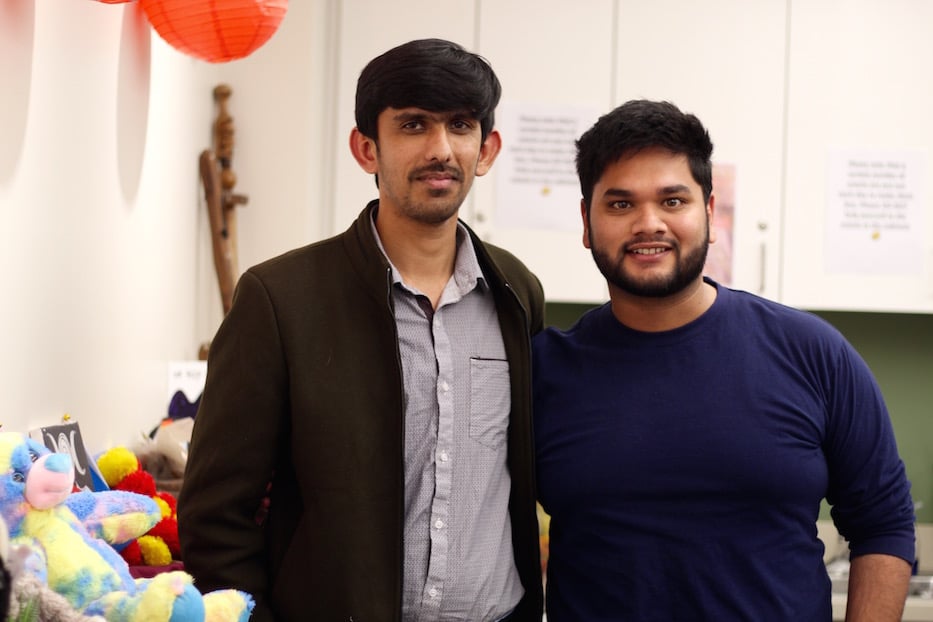
Students Anwar ul-Haq and Syed Najeeb.
The message resonated with several MSA members before and during a communal Iftar, as they dug into fragrant dishes of rice vegetables after sundown. Squeezing between tables and chairs, Ossama collected food preferences from students, writing each down before sending them off to dining services. Nearby, graduate student Anwar ul-Haq walked around the room, a Pyrex dish of dates in his hand. The custom comes from the Prophet Muhammad, who broke his fast with the sweet, pitted fruit. Students lifted them from the dish, the sticky brown skins gleaming.
As he waited for food to arrive, Ossama said this Ramadan has felt different for him. Born in Bridgeport to Egyptian-American parents, Ossama spent his childhood between Connecticut and Cairo. From early on, most of the year unfolded in Egypt, where his family lives between Cairo and Alexandria. He spent summers in Connecticut with his grandparents, Egyptian immigrants with whom he now lives as a commuter student.
In Egypt, “Ramadan is kind of like Christmas here,” he said, later adding the Super Bowl to a list of comparisons. Cinemas and television channels run programming to honor the observance, which marks the holiest month of the Muslim year. Around him, thousands of people are also fasting. He’s able to celebrate with his dad’s family in Alexandria, who are now over 5,000 miles away. Last year, he made the decision to complete his freshman year online, which meant that he could be in Egypt for the entire month.
This year, he vowed to keep Ramadan in his own life. For him, that meant keeping a schedule of daily prayer, and working with fellow Muslim students to make fasting a little easier on campus. Before April, he quit a student job working the grill station in the school’s cafeteria, because it was too hard to concentrate and fast peacefully in a thick, meat-scented fog. He chose to go home for prayers. For the first two weeks of the month, he was golden. Then his habits started to slip.
It can still be a struggle, he said. Last week, he crashed during a 7 p.m. interview for a position on the Undergraduate Student Government Association (USGA). In his words, “My brain was”—he paused and drew out his hands, as if they were beginning to implode at the fingertips—“Boom.”
After realizing that the timing could not have been worse—Ossama had been fasting since very early in the day, and was just 40 minutes from breaking his fast—he requested another interview and was able to do it early. Those kinds of changes make a big difference, he said.
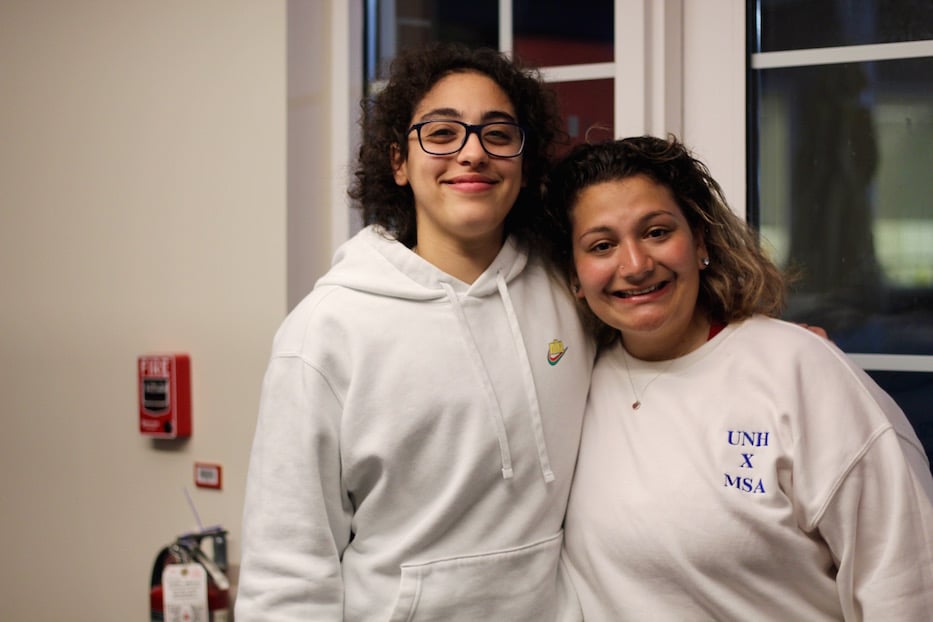
Laila Soliman and Shahd Omar. Soliman is the MSA's director of communications and event coordinator and Omar is the vice president.
Nearby, Gómez checked in on fellow students, making sure that each had everything they needed. Five years ago, she converted to Islam after seeing the peace that fasting and daily prayer brought to a friend after her mother died of pancreatic cancer. While her family “wasn’t the most welcoming [to her Islam] at first,” her parents warmed to it, always ready with questions if there was something they didn’t understand. They now celebrate the anniversary of her choosing to wear a hijab each year.
On campus and off, she has been working to make Ramadan easier each year, she said. Doing “a lot of paperwork” for the school’s administration to recognize the MSA was part of that work. Making sure that her own practice doesn’t suffer is another. For her, Ramadan is a time to do “a lot of self-reflection on who I am,” she said.
“With everything going on in the world, it’s hard to be God-conscious,” she said. “I’ve been in that place. When I’m super stressed, I pray. It helps me stay focused.”
As they dug into their rice, graduate students ul-Huq and Syed Najeeb agreed that the communal Iftars, which put them in touch with fellow graduate and undergraduate students, help them observe Ramadan thousands of miles from home. Najeeb, who is studying civil engineering, moved to West Haven a year and a half ago from Hyderabad, India. He met ul-Huq, who hails from Punjab, Pakistan and is studying computer science, last year.
The two are now roommates—an announcement that Najeeb often delivers with a huge smile on his face.
“India and Pakistan are living in the same room, if you can believe it,” he said Thursday. With a smile, he added that “It’s easier to know you’re not alone” during Ramadan, or as a Muslim on campus. Globally, he can feel violence against Muslims rising, from ethnic cleansing in his home country to hate crimes in the United States.
“This is home,” ul-Huq chimed in.
Junior Shahd Omar, who is studying criminal justice with a minor in Arabic, echoed that sense of community. Born in Watertown, Conn. to Jordanian and Palestinian parents, Omar and her cousins were the only Muslim students in their public, very white high school, she said. At UNH, she’s found that some professors “don’t understand it [Ramadan],” and bristle at extension requests and brain fog among their Muslim students. The MSA gives her an outlet to touch base with other students. Thursday, she and fellow students lobbed Arabic back and forth, switching intermittently into English.
“This is my first sense of belonging in my whole life,” she said. Her work in the MSA has also made her more thoughtful around Ramadan. This year, “I try to stay on top of being peaceful and being nice,” from compliments she pays to fellow students to cheerful greetings she extends to strangers.
"Honestly, it’s brought me so much calmness and peace,” she said.
She showed off a new white sweatshirt that read “Deen Over Dunya” on the back in gold embroidery. The saying represents “a mindset,” said Soliman, who had attended Bajwa’s talk and was still thinking about it half an hour later. “It means religion over this earthly world.”

